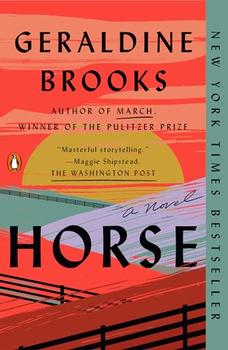Summary | Excerpt | Reading Guide | Reviews | Beyond the Book | Readalikes | Genres & Themes | Author Bio

A Novel
by Geraldine BrooksTHEO
Georgetown, Washington, DC
2019
The deceptively reductive forms of the artist's work belie the density of meaning forged by a bifurcated existence. These glyphs and ideograms signal to us from the crossroads: freedom and slavery, White and Black, rural and urban.
No. Nup. That wouldn't do. It reeked of PhD. This was meant to be read by normal people.
Theo pressed the delete key and watched the letters march backward to oblivion. All that was left was the blinking cursor, tapping like an impatient finger. He sighed and looked away from its importuning. Through the window above his desk, he noticed that the elderly woman who lived in the shabby row house directly across the street was dragging a bench press to the curb. As the metal legs screeched across the pavement, Clancy raised a startled head and jumped up, putting his front paws on the desk beside Theo's laptop. His immense ears, like radar dishes, twitched toward the noise. Together, Theo and the dog watched as she shoved the bench into the teetering ziggurat she'd assembled. Propped against it, a hand-lettered sign: FREE STUFF.
Theo wondered why she hadn't had a yard sale. Someone would've paid for that bench press. Or even the faux-Moroccan footstool. When she brought out an armful of men's clothing, it occurred to Theo that all the items in the pile must be her dead husband's things. Perhaps she just wanted to purge the house of every trace of him.
Theo could only speculate, since he didn't really know her. She was the kind of thin-lipped, monosyllabic neighbor who didn't invite pleasantries, much less intimacies. And her husband had made clear, through his body language, what he thought about having a Black man living nearby. When Theo moved into Georgetown University's graduate housing complex a few months earlier, he'd made a point of greeting the neighbors. Most responded with a friendly smile. But the guy across the street hadn't even made eye contact. The only time Theo had heard his voice was when it was raised, yelling at his wife.
It was a week since the ambulance had come in the night. Like most city dwellers, Theo could sleep right through a siren that Dopplered away, but this one had hiccuped to sudden silence. Theo jolted awake to spinning lights bathing his walls in a wash of blue and red. He jumped out of bed, ready to help if he could. But in the end, he and Clancy just stood and watched as the EMTs brought out the body bag, turned the lights off, and drove silently away.
At his grandmother's house in Lagos, any death in the neighborhood caused a flurry in the kitchen. As a kid visiting on school holidays, he'd often been tasked with delivering the steaming platters of food to the bereaved. So he made a stew the next day, wrote a condolence card, and carried it across the street. When no one answered the door, he left it on the stoop. An hour later, he found it back on his own doorstep with a terse note: Thanks but I don't like chicken. Theo looked down at Clancy and shrugged. "I thought everyone liked chicken." They ate it themselves. It was delicious, infused with the complex flavors of grilled peppers and his homemade, slow-simmered stock. Not that Clancy, the kelpie, cared about that. In the no-nonsense insouciance of his hardy breed, he'd eat anything.
The thought of that casserole made Theo's mouth water. He glanced at the clock in the corner of his laptop. Four p.m. Too early to quit. As he started typing, Clancy circled under the desk and flopped back down across his instep.
These arresting compelling images are the only known surviving works created by an artist born into slavery enslaved. Vernacular, yet eloquent, they become semaphores from a world convulsed. Living Surviving through the Civil War, forsaking escaping the tyranny of the plantation for a marginalized life in the city, the artist seems compelled to bear witness to his own reality, paradoxically exigent yet rich.
Excerpted from Horse by Geraldine Brooks. Copyright © 2022 by Geraldine Brooks. All rights reserved. No part of this excerpt may be reproduced or reprinted without permission in writing from the publisher.




Second hand books are wild books...
Click Here to find out who said this, as well as discovering other famous literary quotes!
Your guide toexceptional books
BookBrowse seeks out and recommends the best in contemporary fiction and nonfiction—books that not only engage and entertain but also deepen our understanding of ourselves and the world around us.